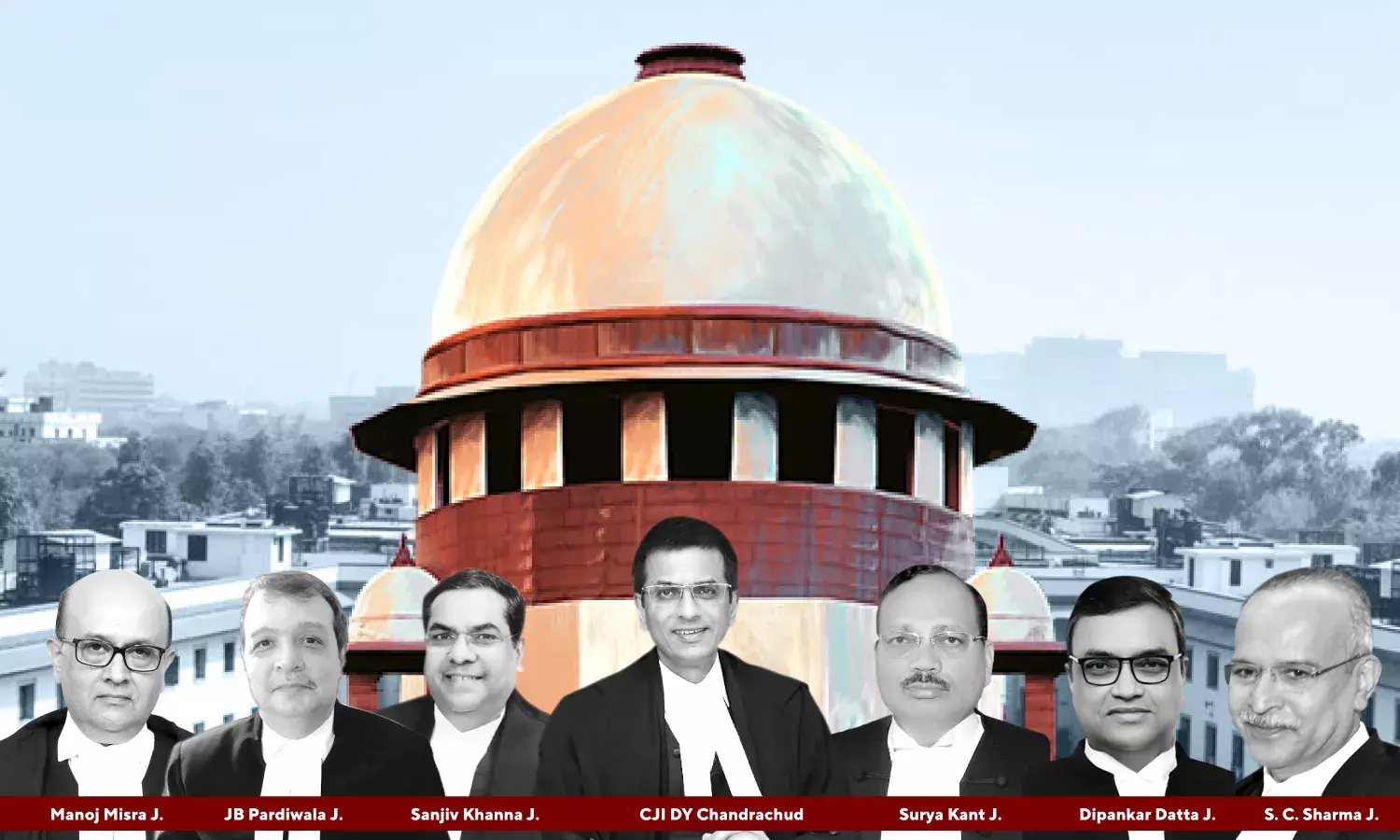Breaking: Supreme Court Seven Judges Bench Overrules 'Azeez Pasha' Judgment That Held That AMU Cannot Claim Minority Status
The Supreme Court today pronounced the judgment in a batch of petitions seeking 'minority status' for the Aligarh Muslim University (AMU).
The Bench of Chief Justice D.Y. Chandrachud, Justice Sanjiv Khanna, Justice J.B. Pardiwala, and Justice Manoj Misra held the majoirty opinion. However, Justice Surya Kant, Justice Dipankar Datta, and Justice Satish Chandra Sharma dissent.
The majority (4:3) has overruled its 1967 decision, whereby it held that AMU cannot claim minority status as it was created by a statute.
At the outset, the CJI said, "There are four opinions; I have authored the majority opinion for myself, Justices Khanna, Pardiwala, and Misra. There are three dissents, authored separately by Justice Surya Kant, Justice Dipankar Dutta, and Justice Satish Chandra Sharma. So, it is 4:3."
The CJI observed that the right granted by Article 30 of the Constitution of India is not absolute, thus regulation of minority institutions is protected under Article 19(6).
"Article 30(1) cannot extend to a situation where a minority community establishes an institute but has no intention to administer it... putting a minority tag on an institution just because it was established by a person/group belonging to a minority community, and this can be done by a way of waiver...Article 30 shall stand diluted if it applies to only institutes that have been established after the constitution came into force. Thus educational institutions established by minority which was established before the constitution came into force will also be governed by Article 30," the CJI said.
The CJI stated that it is important to observe that the institution was not established for a minority community.
Conclusively, the CJI pronounced, "We have held that to be a minority institution, it only had to be established by the minority and not necessarily be administered by the minority members. Minority institutions may wish to emphasise secular education, and for that minority members are not needed in administration."
Furthermore, the Court held, "The view in Azeez Basha that minority character stops when statute comes into force is overruled. Whether AMU is a minority or not should be decided on the basis of the tests laid down in the present case, papers to be placed before the CJI for constituting a bench to decide the issue and correctness of the 2006 Allahabad High Court judgment."
Pertinently, the Court had reserved its verdict on February 1, after it concluded hearing the extensive arguments for eight days.
Representing AMU, Senior Advocate Rajeev Dhavan had argued in favour of Muslim representation within AMU’s management and academic council. Additionally, Senior Advocate Kapil Sibal appeared for the AMU Old Boys Association and had stated that determining AMU’s minority status should not hinge on the Muslim presence within its executive bodies, emphasizing that such status does not require Muslims or Christians to solely manage minority institutions.
The Court had noted the impact of the 1981 AMU Act amendment, which restored limited Muslim representation at AMU following the 1967 Azeez Basha ruling. Sibal had argued that the founders had envisioned AMU with government oversight but without government control, and he dismissed claims that the founders' alleged loyalty to the British undermines the university’s minority character.
It is to be noted that in February 2019, the Apex Court had referred to a seven-judge bench the contentious issue. A similar reference was also made in 1981. In 1967, a five-judge constitution bench in the S. Azeez Basha v. Union of India case held that since AMU was a central university, it cannot be considered a minority institution. In 1981, its minority status was restored when Parliament passed the AMU (Amendment) Act. In January 2006, the Allahabad High Court struck down the provision of the 1981 law by which the university was accorded the minority status.
Cause Title: Aligarh Muslim University v. Naresh Agarwal & Ors. [C.A. No. 2286/2006]
Click here to read/download the Judgment












